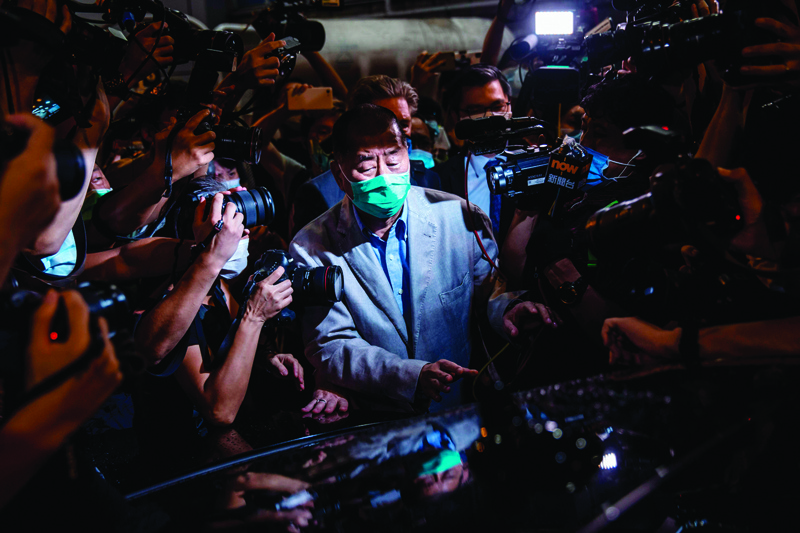
HONG KONG: Hong Kong pro-democracy media mogul Jimmy Lai yesterday told his reporters to "fight on" following his dramatic arrest, as China widens its crackdown against critics in the semi-autonomous business hub. The clampdown has gathered pace since Beijing imposed a sweeping security law on Hong Kong in June, with opposition politicians disqualified and activists arrested for social media posts. The moves have provoked outrage in the West and deepened fears for millions who last year took to the streets to protest communist China's tightening grip on the city.
In one of the most dramatic days of the crackdown, Lai was among 10 people detained under the new law on Monday as around 200 police officers searched the newsroom of his Apple Daily tabloid, which is unapologetically critical of Beijing. The 71-year-old was cheered by staff and handed a bouquet yesterday as he returned to the newsroom following a late night release on bail after 40 hours in custody. In images broadcast live on Facebook by his own reporters, he told staff to continue filing the kind of unvarnished dispatches that have infuriated China and pro-Beijing politicians in Hong Kong.
"Fight on! Let's fight on," he said. "We have the support of the Hong Kong people. We can't let them down." He told staff it was becoming "increasingly difficult" to run a media business in Hong Kong. "Luckily I was not sent back to the mainland," he quipped in a characteristic display of dark humor. China has declared it will have jurisdiction over especially serious national security crimes, toppling the legal firewall between the mainland's party-controlled courts and Hong Kong's independent judiciary.
Sweeping new law
Beijing imposed the new national security law in response to huge and often violent pro-democracy protests last year. It has described the law-its contents kept secret until it was enacted on 30 June-as a "sword" hanging over the heads of opponents in Hong Kong. It officially criminalizes secession, subversion, terrorism and colluding with foreign forces. But the broadly worded provisions outlawed certain political speech overnight, such as advocating sanctions, and greater autonomy or independence for Hong Kong. Similar laws are used on the authoritarian mainland to snuff out opposition. The most serious crimes under the Hong Kong law-which is not supposed to be retroactive-carry up to life in jail.
Police have given limited details of their alleged case against Lai and those arrested on Monday. They say the group were involved in lobbying for foreign sanctions before the security law was passed and that they continued to operate in some form once the legislation came in. Among those arrested were two of Lai's sons, senior Apple Daily executives and three members of now disbanded pro-democracy party Demosisto-including 23-year-old Agnes Chow, a prominent activist.
Regional media hub
Critics believe the security law has ended the key liberties and autonomy that Beijing promised Hong Kong could keep after its 1997 handover by Britain. The US has declared Hong Kong no longer autonomous from the mainland and deployed sanctions in response. Secretary of State Mike Pompeo described Lai's arrest as "further proof" that Chinese authorities had "eviscerated Hong Kong's freedoms and eroded the rights of its people". Britain has said it will ramp up efforts to allow Hong Kongers to relocate there.
Western criticism sparked fury in Beijing, which has responded with sanctions against US officials. Hong Kong is a major media hub with a vibrant local press and multiple international news outlets operating regional headquarters in the city. Both China and Hong Kong's government vowed the security law would keep press freedoms in tact. But the police operation against Lai sparked denunciations of plunging press freedoms. The city's ranking on the Reporters Without Borders press freedom index has already fallen from 18th in 2002 to 73rd in 2019.
Several foreign media groups have reported sudden delays in getting visas renewed for staff or outright rejections. The New York Times announced plans to move a third of its employees from its Hong Kong newsrooms to South Korea as a result. Local media reported that a new unit has been set up in Hong Kong's immigration department to vet visa applications for foreign journalists. The Immigration Department has declined to comment on the reports.- AFP










